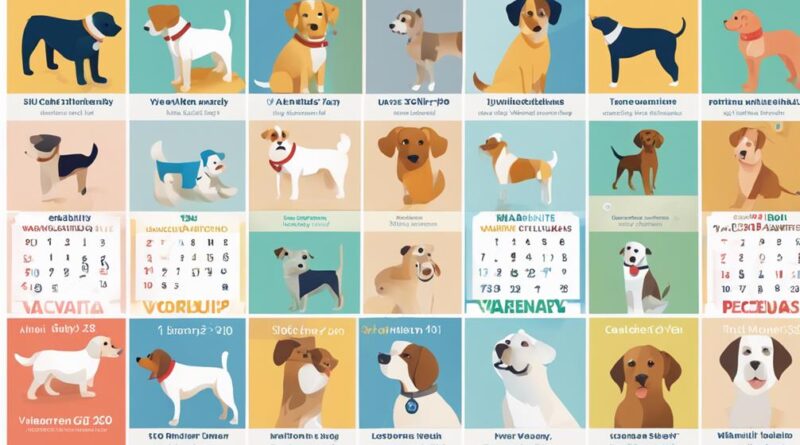15 Key Vaccination Schedules Every Dog Owner Should Know
Ensure your dog's health with these 15 key vaccination schedules. Consult your vet for guidance on essential vaccines like rabies, distemper, parvovirus, and adenovirus. Tailor non-core vaccines to address specific risks. Stay current on rabies shots to comply with the law. Guard against distemper and parvovirus with booster shots. Protect respiratory health with adenovirus, parainfluenza, and bordetella vaccines. Shield against leptospirosis and Lyme disease with timely vaccinations. Maintain overall well-being with heartworm prevention. Be proactive with vaccine boosters for lasting immunity. Your four-legged friend's health depends on these crucial vaccination schedules.
Puppy Vaccination Timeline
When planning a puppy vaccination timeline, it's crucial to consult with a veterinarian to ensure proper protection against common diseases. Apart from vaccinations, early socialization plays a vital role in shaping your puppy's behavior. Introducing your puppy to various people, animals, and environments during the critical socialization period of 3 to 14 weeks can help prevent fear and aggression issues later in life. It's essential to expose your puppy to different stimuli in a positive and controlled manner to build confidence and reduce anxiety.
Training techniques are also essential during the puppy vaccination timeline. Positive reinforcement training methods, such as using treats or praise, can help teach your puppy basic commands and good behaviors. Consistency is key when training your puppy, so establishing a routine and setting clear boundaries will aid in their overall development. Remember to keep training sessions short and fun to maintain your puppy's interest and attention.
Furthermore, puppy classes can be a great way to socialize your furry friend with other dogs and people in a safe environment. These classes not only provide an opportunity for socialization but also offer guidance from professional trainers on how to address common behavior issues. By combining proper vaccination protocols with effective socialization tips and training techniques, you can set your puppy up for a healthy and well-adjusted life.
Core Vaccines for Dogs
For optimal protection against common diseases, ensuring your dog receives core vaccines is essential. Core vaccines are crucial for preventing serious illnesses and maintaining your dog's overall health. These vaccines are considered essential because they protect against diseases that are widespread, highly contagious, and can be severe or even fatal. The core vaccines recommended for all dogs include rabies, distemper, parvovirus, and adenovirus.
Vaccine efficacy is a key factor to consider when discussing core vaccines. These vaccines have been proven to be highly effective in preventing the diseases they target. It's important to follow the recommended immunization protocols to ensure that your dog develops the necessary immunity. Vaccination reactions, while possible, are generally rare and mild compared to the risks associated with the diseases themselves.
When it comes to core vaccines, vaccination intervals are crucial. Puppies require a series of vaccinations to build up their immunity, starting at around 6-8 weeks of age. Booster shots are then needed to maintain immunity throughout your dog's life. Your veterinarian will provide guidance on the appropriate schedule for your dog based on factors such as age, lifestyle, and risk of exposure to certain diseases. By staying up to date with your dog's core vaccinations, you're taking a proactive step in safeguarding their health and well-being.
Non-Core Vaccines Overview
Exploring additional protection options for your dog, non-core vaccines play a role in addressing specific health risks. While core vaccines are essential for all dogs due to the widespread prevalence of the diseases they protect against, non-core vaccines are recommended based on factors like lifestyle, environment, and individual health risks. These vaccines target diseases that are less common or are region-specific, offering tailored protection for your furry friend.
When considering non-core vaccines for your dog, it's important to be aware of vaccine safety precautions. Like with any medical intervention, vaccines can have side effects. However, the risk of serious side effects is minimal compared to the benefits they provide in preventing potentially fatal diseases. Your veterinarian can provide guidance on potential side effects and how to monitor your dog after vaccination.
Vaccine effectiveness studies are crucial in determining the efficacy of non-core vaccines. These studies assess how well the vaccine protects against the target disease and for how long. Understanding the effectiveness of a vaccine can help you make informed decisions about which non-core vaccines are most appropriate for your dog based on their lifestyle and risk factors.
Rabies Vaccination Schedule
Understanding the importance of the rabies vaccination schedule is crucial for safeguarding your dog's health and complying with local regulations. Rabies is a fatal viral disease that can affect all warm-blooded animals, including humans. In many places, including the United States, rabies vaccination for dogs is required by law to prevent the spread of this deadly disease.
When it comes to the rabies vaccination schedule, it's essential to adhere to the recommended guidelines provided by your veterinarian. Typically, puppies should receive their first rabies vaccine at around 12-16 weeks of age, with a booster shot given a year later. Afterward, the vaccine is usually administered every 1-3 years, depending on the specific vaccine used and local regulations.
Proper storage of the rabies vaccine is crucial to ensure its effectiveness. Vaccines should be stored according to the manufacturer's instructions, typically at a controlled temperature between 2-8 degrees Celsius. Failure to store the vaccine correctly can render it ineffective, putting your dog at risk.
In addition to vaccination, there are essential rabies prevention tips to keep your dog safe. Avoiding contact with wildlife, such as bats, raccoons, and skunks, is vital in preventing exposure to the rabies virus. If you suspect your dog has been bitten by a wild animal or is showing symptoms of rabies, seek immediate veterinary care. By following the recommended vaccination schedule and taking preventive measures, you can help protect your dog from this deadly disease.
Distemper Vaccination Frequency
Ensure your dog's protection against distemper by understanding the recommended vaccination frequency. Distemper vaccination is crucial in safeguarding your furry friend from this highly contagious viral disease. The importance of the distemper shot lies in its ability to provide immunity against a potentially fatal illness. Monitoring the frequency of distemper vaccinations is key to ensuring continuous protection for your canine companion.
The immunity duration provided by the distemper shot can vary depending on factors such as the dog's age, health status, and the type of vaccine used. Generally, puppies receive a series of distemper vaccinations starting at around 6-8 weeks of age, with booster shots administered every 2-4 weeks until they're around 16 weeks old. Adult dogs usually receive a booster one year after the initial series, followed by regular booster shots every 1-3 years thereafter.
It is essential to set up a distemper vaccination reminder to keep track of when your dog is due for their next shot. Consult with your veterinarian to create a vaccination schedule tailored to your dog's specific needs. By staying proactive and consistent with your dog's distemper vaccinations, you can help protect them from this serious disease and ensure their long-term health and well-being.
Parvovirus Shot Schedule
To maintain your dog's overall protection, it's important to be aware of the recommended Parvovirus shot schedule. Parvovirus is a highly contagious viral disease that can be potentially fatal, especially in puppies and unvaccinated dogs. Prevention strategies are crucial in safeguarding your furry companion against this threat.
The Parvovirus vaccination schedule typically starts when your puppy is around 6 to 8 weeks old, with additional boosters given every 3-4 weeks until they're about 16 weeks old. This series of vaccinations helps build up their immunity against the virus. However, it's essential to follow up with regular booster shots to ensure continued protection.
Parvovirus immunity duration can vary among individual dogs. While some may retain immunity for several years after the initial vaccination series, others may require more frequent boosters. Your veterinarian can conduct blood tests to check your dog's antibody levels and determine the most appropriate vaccination schedule.
Adenovirus Vaccination Timeline
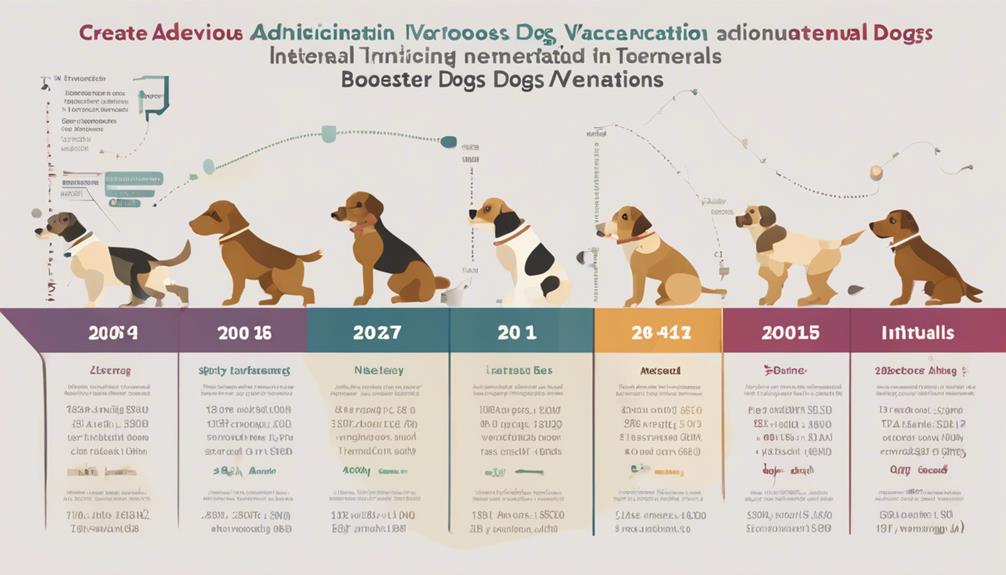
When considering your dog's health, adhering to the recommended Adenovirus vaccination timeline is crucial. Adenovirus protection is essential for your canine companion's overall well-being. This virus can cause serious respiratory and liver issues in dogs, making vaccination benefits vital for their long-term health.
The Adenovirus vaccination timeline typically starts when your puppy is around 6 to 8 weeks old. At this age, your vet will administer the first dose of the vaccine. This initial shot helps kickstart your dog's immune response against Adenovirus, laying the foundation for future protection.
Boosters are then required every 3-4 weeks until your pup reaches 16 weeks of age. These additional doses are crucial for ensuring your dog develops a robust immunity to Adenovirus. After the initial puppy series, a booster shot is usually recommended within one year, followed by regular boosters every 1-3 years, depending on your vet's advice.
Canine Parainfluenza Shots
Start by scheduling your dog's Canine Parainfluenza shots at the appropriate intervals recommended by your veterinarian to ensure comprehensive protection against this respiratory infection. Canine parainfluenza is a highly contagious respiratory virus that can cause symptoms such as coughing, nasal discharge, and fever in dogs. The vaccination is a crucial tool in preventing the spread of this virus and protecting your furry friend.
Canine parainfluenza prevention methods primarily revolve around vaccination. The vaccine works by stimulating the immune system to produce antibodies against the parainfluenza virus. This helps the dog's body recognize and fight off the virus if they're ever exposed to it. By following the recommended vaccination schedule, you can ensure that your dog has optimal protection against parainfluenza.
When it comes to parainfluenza vaccine efficacy, studies have shown that properly vaccinated dogs have a significantly reduced risk of contracting the virus. While the vaccine may not offer 100% protection, it can help lessen the severity of symptoms if the dog does become infected. Additionally, vaccinated dogs are less likely to spread the virus to other dogs, making it an essential part of community-based disease prevention efforts.
Bordetella Vaccination Details

Consider incorporating your veterinarian's recommendations into your dog's Bordetella vaccination plan to safeguard against this respiratory infection. Bordetella, also known as kennel cough, is highly contagious among dogs, especially in places like dog parks, boarding facilities, and grooming salons. The Bordetella vaccine plays a crucial role in protecting your furry friend from this airborne disease.
Bordetella is primarily transmitted through the air by respiratory secretions from infected dogs. The close proximity between dogs in environments like boarding facilities increases the risk of transmission. Symptoms of Bordetella include a persistent cough, nasal discharge, and mild fever. Severe cases can lead to pneumonia, especially in puppies, elderly dogs, or those with weakened immune systems.
The Bordetella vaccine is effective in reducing the severity of symptoms and preventing the spread of the infection. It's available in various forms, including intranasal or injectable vaccines. Your veterinarian will recommend the most suitable option based on your dog's age, health status, and lifestyle. While the vaccine provides protection, it may not completely eliminate the risk of infection. Regular boosters are essential to maintain immunity levels and ensure continued protection against Bordetella. Consult your veterinarian to develop a vaccination schedule tailored to your dog's specific needs and risk factors.
Leptospirosis Vaccine Timing
For optimal protection against leptospirosis, ensure your dog receives the vaccine according to the recommended timing schedule. Leptospirosis is a bacterial disease that can affect both animals and humans, making it crucial to follow proper prevention strategies, including vaccination. The leptospirosis vaccine is typically administered in two doses, 2-4 weeks apart, with annual boosters recommended to maintain immunity.
Leptospirosis prevention strategies are essential due to the risks of outbreaks in certain environments. This disease is commonly spread through contact with contaminated water sources, soil, or the urine of infected animals. Dogs that frequent areas with standing water, wildlife, or exposure to rodents are at higher risk of contracting leptospirosis. Therefore, timely vaccination plays a vital role in protecting your furry companion from this potentially serious illness.
Understanding the leptospirosis outbreak risks is crucial for dog owners to grasp the importance of vaccination. Outbreaks can occur in urban areas, rural regions, and anywhere with suitable conditions for the bacteria to thrive. Symptoms of leptospirosis in dogs can range from mild illness to severe organ damage, emphasizing the significance of timely vaccination in safeguarding your pet's health.
Lyme Disease Shot Schedule
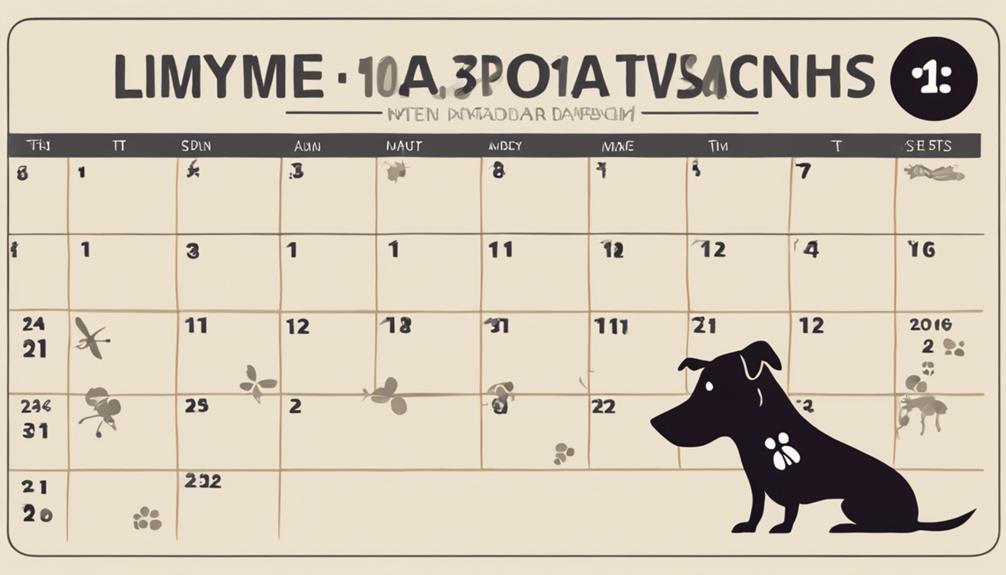
Establishing a consistent schedule for your dog's Lyme disease shots is crucial for their protection against this tick-borne illness. Lyme disease is transmitted through the bite of infected ticks, and vaccination is one of the key preventive measures to safeguard your furry companion. The Lyme disease shot schedule typically involves an initial series of shots followed by booster doses to ensure continued immunity.
Tick prevention strategies are essential in conjunction with the Lyme disease vaccination to provide comprehensive protection. Regularly using tick preventatives, checking your dog for ticks after outdoor activities, and maintaining a well-groomed yard can help reduce the risk of tick exposure. These strategies, combined with the vaccination schedule, form a robust defense against Lyme disease.
Recognizing Lyme disease symptoms is also important for early detection and treatment. Keep an eye out for signs such as fever, lethargy, joint swelling, and decreased appetite. If you notice any of these symptoms in your dog, consult your veterinarian promptly for proper diagnosis and treatment.
Canine Influenza Vaccination
Creating a proactive vaccination plan for your dog against Canine Influenza is vital for their overall health and well-being. Canine Influenza, also known as dog flu, is a contagious respiratory disease caused by specific Type A influenza viruses that primarily affect dogs. To protect your furry friend from this illness, it's essential to consider the canine influenza outbreak prevention strategies available, with vaccination playing a crucial role.
The Canine Influenza vaccine is designed to reduce the severity of the disease if your dog contracts the virus and help prevent further spread. While the vaccine may not completely guarantee immunity, it significantly decreases the likelihood of your dog contracting the flu and can lessen the severity and duration of symptoms if they do get infected. This highlights the importance of the flu shot effectiveness in safeguarding your pet's health.
Annual revaccination against Canine Influenza is typically recommended to ensure continued protection, especially if your dog frequents places where they may come into contact with other dogs, such as parks, daycare facilities, or boarding kennels. By staying up to date with your dog's vaccinations, you aren't only protecting your furry companion but also contributing to the overall well-being of the canine community.
Kennel Cough Vaccines
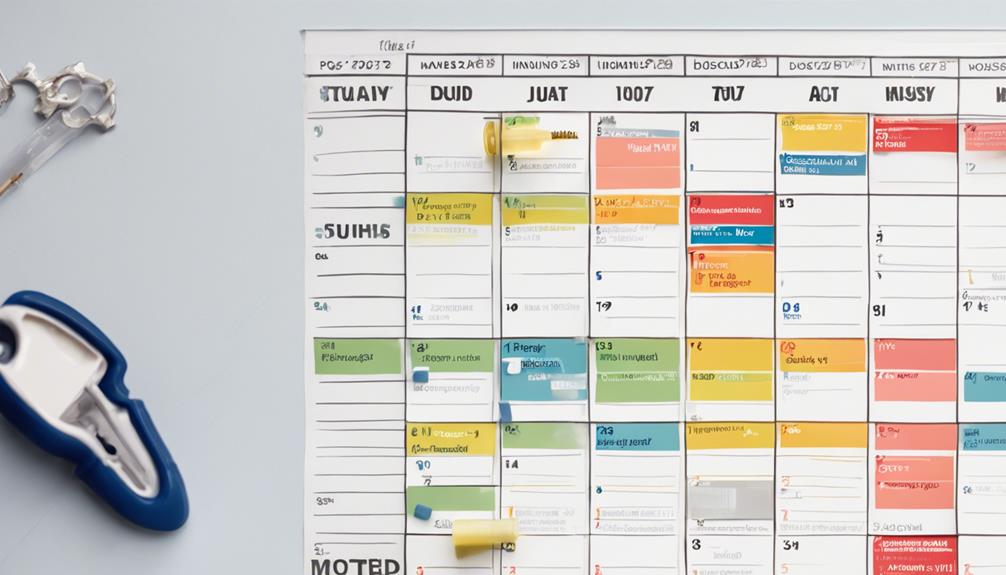
To protect your dog from kennel cough, considering the importance of vaccination is key to maintaining their respiratory health. Kennel cough, also known as canine infectious tracheobronchitis, is a highly contagious respiratory disease in dogs. The most common symptom is a persistent, dry cough that can sound like your dog has something stuck in their throat. Other symptoms may include retching, sneezing, nasal discharge, and mild fever.
Prevention of kennel cough primarily involves vaccination. The kennel cough vaccine is often recommended for dogs that are frequently in contact with other dogs, such as those who visit boarding facilities, dog parks, or training classes. The vaccine helps reduce the severity of the disease if your dog does contract it, and it can also lower the risk of transmission to other dogs.
Treatment for kennel cough usually involves supportive care, such as rest, proper hydration, and sometimes cough suppressants. Antibiotics may be prescribed if a bacterial infection is suspected. It's important to isolate your dog to prevent the spread of the disease to other dogs, as kennel cough is easily transmitted through the air or direct contact with respiratory secretions.
Heartworm Prevention Shots
When considering heartworm prevention for your dog, scheduling regular heartworm prevention shots is crucial to safeguard their health. These shots are highly effective in protecting your furry friend from heartworm disease, a potentially fatal condition transmitted by mosquitoes. Heartworm prevention shots work by killing the immature larvae before they can develop into adult worms in your dog's heart, lungs, and blood vessels.
The effectiveness of heartworm prevention shots is well-documented, with a high success rate in preventing heartworm infection when administered on schedule. It's essential to follow your veterinarian's recommended dosage and administration frequency for optimal protection. Consistency is key in ensuring that your dog remains free from this serious and often costly illness.
In addition to heartworm prevention shots, there are alternative methods to protect your dog from heartworm disease. Oral medications, topical solutions, and injectable preventives are available options that can be discussed with your veterinarian. While these alternatives can be effective, they may require different administration schedules or have varying levels of protection compared to heartworm prevention shots. Consult with your vet to determine the most suitable heartworm prevention method for your dog based on their individual needs and lifestyle.
Vaccine Boosters for Dogs
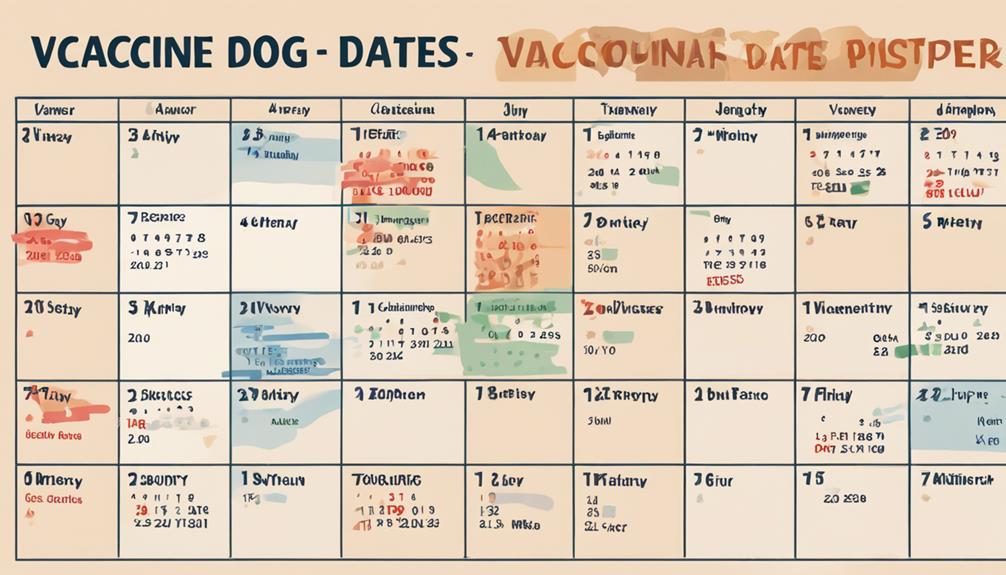
Implementing timely vaccine boosters for your canine companion is essential to maintain their immunity against various diseases. Vaccine efficacy plays a crucial role in ensuring that your dog is adequately protected, and booster shots are necessary to enhance and prolong this protection. Understanding the importance of vaccine boosters can help you make informed decisions regarding your pet's health. Here are some key points to keep in mind:
- Vaccine Efficacy: Vaccines work by stimulating your dog's immune system to produce antibodies against specific diseases. Over time, the effectiveness of these antibodies may decrease, making booster shots necessary to reinforce immunity levels.
- Booster Necessity: Boosters are essential to ensure that your dog remains protected against common infectious diseases. Without timely boosters, your dog may become vulnerable to illnesses that can be easily prevented through vaccination.
- Consult Your Veterinarian: Your veterinarian is the best resource to guide you on the appropriate vaccine schedule for your dog. They can assess your dog's individual needs and recommend the most suitable booster shots.
- Stay Updated: Stay informed about the recommended vaccination schedules for your dog's specific age, breed, and lifestyle. Regularly updating your pet's vaccines can help prevent the spread of contagious diseases and keep your furry friend healthy and happy.
Frequently Asked Questions
Can My Dog Receive Multiple Vaccines at the Same Time?
Yes, your dog can receive multiple vaccines at the same time. Vaccine combinations are safe and common practice in veterinary medicine.
However, timing considerations are important to ensure each vaccine's effectiveness. Your veterinarian will determine the best schedule for your dog based on their age, health status, and risk factors.
What Are the Possible Side Effects of Dog Vaccinations?
When it comes to dog vaccinations, it's important to be aware of potential side effects. While most dogs don't experience severe reactions, some may exhibit mild symptoms like soreness or lethargy.
It's crucial to monitor your dog after vaccinations and contact your vet if you notice any concerning signs. Side effect management involves providing comfort and monitoring your dog's health closely.
Ensuring vaccine safety is key in preventing adverse vaccination reactions.
Is It Safe to Vaccinate a Pregnant or Nursing Dog?
When considering vaccination timing during pregnancy or while nursing a dog, it's crucial to prioritize safety. Vaccinating a pregnant or nursing dog can pose risks to both the mother and her puppies.
Consult with your vet to determine the best course of action. They can provide guidance on when it's safe to vaccinate your dog during these stages to ensure the health and well-being of the entire family.
Are There Alternative Vaccination Schedules Available for Dogs?
When it comes to alternative vaccination schedules for dogs, there are options that consider natural immunity and homeopathic approaches. These schedules may vary from traditional ones but can still provide protection.
Discuss with your veterinarian about tailoring a vaccination plan that aligns with your dog's specific needs and health status. Keep in mind that while alternative schedules exist, they should be carefully considered and implemented under professional guidance to ensure your dog's well-being.
How Do I Know if My Dog Is Due for a Vaccine Booster?
If your dog is due for a vaccine booster, watch for signs like lethargy, decreased appetite, or a runny nose.
Booster timing is crucial for vaccine effectiveness, so keep track of your pet's vaccination schedule.
Missing boosters can leave your dog vulnerable to diseases.
Stay proactive and consult your vet to ensure your furry friend stays healthy and protected.
Conclusion
Ensure your furry friend stays healthy and protected by following these key vaccination schedules.
From puppy vaccinations to booster shots, staying up to date on your dog's vaccines is essential for their overall well-being.
Consult with your veterinarian to create a personalized vaccination plan tailored to your dog's specific needs.
By staying informed and proactive, you can help prevent the spread of harmful diseases and keep your dog happy and healthy for years to come.
